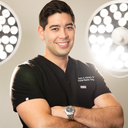This is very common and realistic question patients will ask at their preoperative appointment. The answers vary greatly from surgeon to surgeon. My recommendation is no alcohol with 48 hours of surgery. The reason is alcohol is a diuretic (increases the amount you urinate), which could result in you presenting on the day of surgery somewhat dehydrated, potentially creating issues for the anesthesia team. Also, having alcohol in your system at the time of surgery could interact and potentiate the anesthesia given to you. Finally, if you routinely have alcohol of some quantity on a routine basis, depending on to what degree of consumption, this can decrease your blood’s ability to clot, and therefore should be reviewed with your surgeon prior to surgery. Post-operatively you should never consume any alcohol while on pain medication or sleeping medication given for your post-op healing period.








